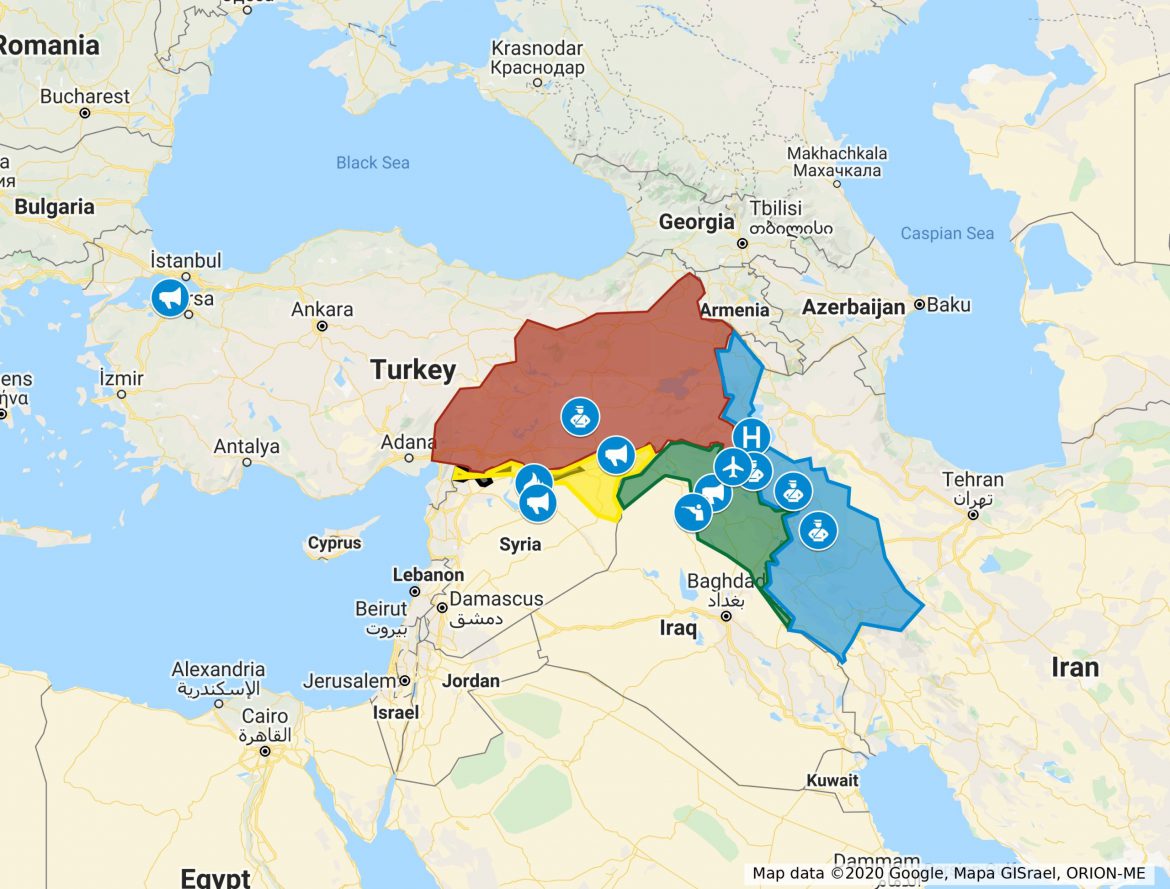2.5K
Iran
- The coronavirus continues to spread in Iran and Iranian Kurdistan, with several human rights groups accusing the Iranian regime of obscuring the actual number of cases and fatalities. The Hengaw Organization for Human Rights reported at least 44 people died in the Kurdish provinces of Kermanshah, Ilam, Kurdistan, and West Azerbaijan. Likewise, several videos posted on social media showed ill people on the streets of cities in Iranian Kurdistan who had received no care. Meanwhile, inmates in Urmia prison launched a day-long strike to protest Iranian authorities’ inadequate response to a coronavirus outbreak in the facility.
- The fate of a number of Kurdish activists and citizens previously arrested by Iranian authorities in Saqqez and Piranshahr remains unknown. In Saqqez, the Iranian regime detained three relatives of Rawoof Sheikhi, a deceased member of the Kurdistan Free Life Party (PJAK), on February 14. Sheikhi was killed during clashes between Iranian forces and the PJAK six years ago. In Piranshahr, the Intelligence Organization of the Islamic Revolutionary Guard Corps (Ettela’at) arrested seven Kurds for “cooperation with Kurdish opposition parties” on March 1. Two of the arrested Kurds have since been released, but Ettela’at refuses to release any information regarding the five who remain in custody. Concurrently, the Sanandaj Islamic Revolutionary Court sentenced a Kurdish environmental activist named Sirwan Rahimi to 13 months in prison.
Iraq
- The Kurdistan Regional Government (KRG) announced the shutdown of government offices and schools until March 26 as a preventive measure against the spread of the coronavirus. The KRG had previously ordered the closing of schools and worship places, while the government’s most recent decision will result in a pause of most civil court functions. The KRG’s rulings come as a new coronavirus case was confirmed in Erbil last week. In Sulaymaniyah, a 73-year-old man died from the disease, while another recovered and is slated to be discharged from the hospital. In Kirkuk, three previously infected individuals made complete recoveries and no additional cases were reported. On another note, Iraqi and Kurdish security forces began cracking down on smugglers attempting to bring people through the closed Iran-Iraq border.
- Two US Marines were killed during an operation targeting ISIS (Da’esh) terrorists near Makhmour district between Erbil and Kirkuk on Sunday. A Combined Joint Task Force-Operation Inherent Resolve (CJTF-OIR) press release stated the two Marines were “advising and accompanying Iraqi Security Forces during a mission to eliminate an ISIS terrorist stronghold.” The region, also known as the “Disputed Territories,” has been plagued by an increasing number of Da’esh attacks since Iraqi forces and Iranian-backed militias responded to the Kurdish independence referendum by removing Kurdish Peshmerga forces on October 16, 2017.
- On Monday, Turkish airstrikes hit Iraqi Kurdistan’s Balakayati region. Though no casualty reports regarding the most recent strikes have emerged so far, several villages in Iraqi Kurdistan remain occupied by Turkish forces since Turkey invaded the region to ostensibly combat the Kurdistan Workers’ Party (PKK) in May 2019. Turkey’s military incursion, dubbed Operation Claw, has killed more than 30 civilians and forced the evacuation of hundreds of villages, many of which remain uninhabited.
Syria
- The Autonomous Administration of North and East Syria (AANES) condemned Bashar al Assad’s previous remarks on Syria’s Kurds and described them as “in harmony with Turkish anti-Kurdish policies.” Assad had previously told Russia Today (RT) there is “no Kurdish issue in Syria” and that Syria’s Kurds were refugees from Turkey. The AANES went on to say, “The logic of the [Syrian] regime did not bring with it any solutions over the past years and insisting on this approach does not serve the chances of a solution.” Syria’s Kurds fear Assad’s recent remarks are connected to a part of the Russian-Turkish deal over Idlib that could allow Turkey to occupy more Kurdish lands. Russian President Vladimir Putin and Turkish President Recep Tayyip Erdogan hashed out an agreement to temporarily halt fighting in Idlib last Thursday. On Monday, Erdogan claimed he made an offer to Putin and US President Donald Trump to manage the oil in northeastern Syria that is currently controlled by the Syrian Democratic Forces (SDF).
- Small numbers of displaced families from Idlib continued to reach SDF-controlled territories in northeastern Syria last week. A total of 1500 families have found refuge in SDF-administered areas since the beginning of the Idlib crisis. Meanwhile, Turkish-backed jihadists continued to attack SDF and Syrian regime territories along the strategic M4 highway near Ain Essa.
- In a joint press conference with the SDF, Operation Inherent Resolve spokesperson Colonel Miles Caggins said, “We will stay and wherever we are partnered with the SDF physically, we will do anything we can to support the SDF in the fight against ISIS.” Caggins’ statements follow several recent joint US-SDF operations targeting Da’esh remnants in Syria.
Turkey
- A Turkish court in Istanbul sentenced the former Kurdish mayor of Diyarbakir, Adnan Selcuk Mizrakli, to nine years, four months, and 15 days in prison for “membership of a terrorist organization.” Mizrakli was elected as Diyarbakir’s mayor in March 2019, but later removed along with 31 other Kurdish mayors and elected officials by the Turkish government last October. Mizrakli’s sentence has elicited outrage from Turkey’s Kurdish population and the pro-Kurdish Peoples’ Democratic Party (HDP). Simultaneously, Sara Kaya, the former mayor of Nusaybin who was elected in 2014 and sacked in 2017, remains jailed after her trial was postponed until early May.
- Kurdish leader Abdullah Ocalan’s attorneys released a statement following their client’s visit with his family last week. Ocalan’s lawyers confirmed there was a fire on Imralı Island, where Ocalan remains imprisoned, and demanded the end of their client’s isolation, stating, “The way isolation is executed in Imralı Prison causes permanent concerns for the families and the public opinion. The lawyer and family visit, one of the fundamental rights of prisoners, has never been allowed on Imralı Island and has always been used as a tool of blackmail and threat.”

